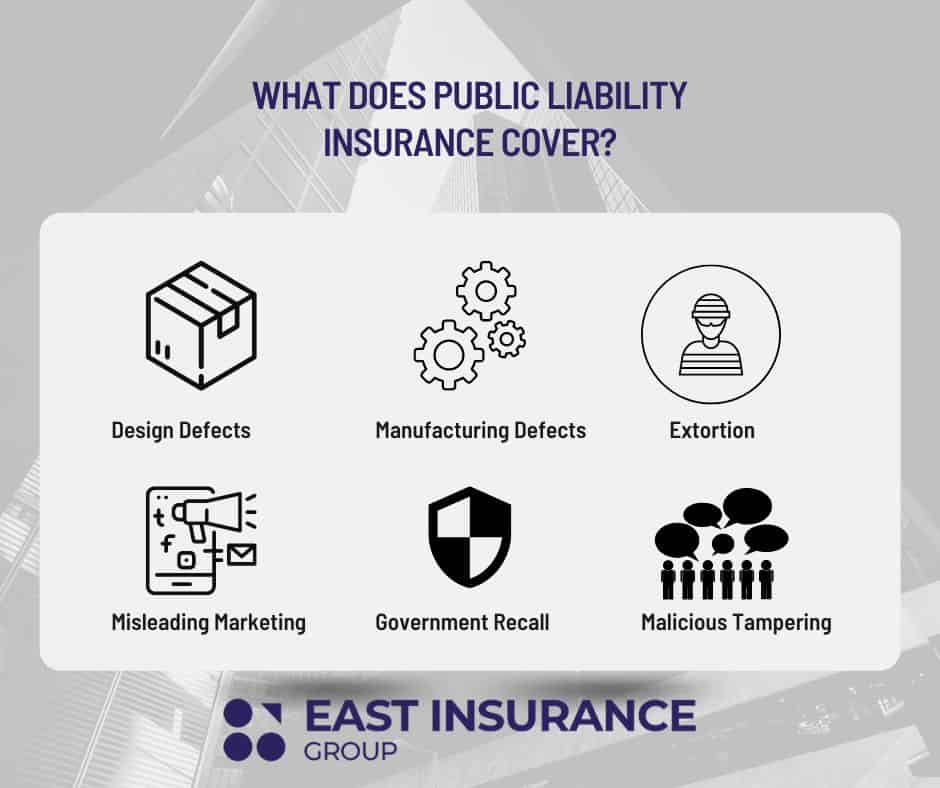Product Liability Insurance: Costs, Benefits, and Who Needs It
Product liability insurance can protect your business from bankruptcy. Check out this example: In 2017, a whipped cream dispenser exploded and killed a popular French Instagram model and fitness blogger.
If you pierce a whipped cream dispenser with a pin, it releases gas and pressurizes the cream container. In this tragic case, the nitrous oxide in the canister exploded, resulting in the French model’s death. The company that produced the whip cream dispenser then recalled the product.
This is not the only case of a company recalling a product because of damage or injury.
Even the most prominent companies have recalled their products, usually due to contamination, manufacturing defects, or design flaws.
But a product recall can also lead to a significant financial loss, damaged professional reputations, and even a total rejection of the company’s products. That’s why businesses should always think one step ahead and get financial protection from more significant risks.
For example, suppose a customer uses a product incorrectly. In that case, your organization could be liable for any damages caused by the product, and you could face a lawsuit in case it injures a customer.
So what is product liability insurance? Product liability insurance covers your business from client claims that your product (the product you sold, created or distributed) doesn’t work properly and caused property damages or bodily injuries.
In this article, we will discuss the definition of product liability insurance, costs, coverage, examples of small business product liability insurance, and much more.
Have questions or want to check the price of product liability insurance for your business? Contact us now and get all the information you need fast and for free!

What is Product Liability Insurance?
Let’s say your company manufactures or sells products with a defect that caused injury or property damage. In this case, a third party could hold you liable for the incident.
What is product liability insurance definition? It’s a type of business insurance for businesses that sell and manufacture products. Liability product insurance covers the cost of product liability lawsuits and other claims related to defective products.
A product can be any type of good your company sells to consumers or other businesses, from clothing, food, and medicines to devices and machines.
As a result, anyone who comes in contact with your product — the buyer, the user, or even a bystander — can be the injured third party.
Read more: The Ultimate Guide To Commercial Property Insurance
What Does Product Liability Insurance Cover?

Product liability insurance covers compensation claims if someone sues your company because your product caused an injury or damage to their property.
However, even if you don’t directly manufacture products, you might be held responsible for the products you sell.
For example, if the products carry the name of your business or the manufacturer has gone out of business, your business will have to deal with product liability claims.
How Does Product Liability Insurance Work?
Insurance for products also covers the claims that arise from design defects, manufacturing defects, extortion, flawed marketing, government recalls, and malicious tampering.
- Design defects happen due to poor design or insufficient product testing. They are present before making the product.
- Manufacturing defects occur during the manufacturing or assembling of the product.
- Extortion happens when someone is deliberately making a product dangerous to life.
- Flawed or misleading marketing is sometimes used to push product sales. This might also lead to a product recall.
- Government recall occurs when the government must step in and order the product’s recall for safety reasons.
- Malicious tampering occurs when, for example, a group of disgruntled employees causes severe damage to the company’s reputation and sales.
- Strict liability is a customer gets injured by a product. Strict liability is also when your business isn’t found at fault, but a customer gets hurt.
Whether a business recalls a faulty product or the government has to announce a mandatory recall, the compensation costs of a product recall can be very high.
In short, product liability insurance will reimburse your small business for financial losses related to a product lawsuit.
What Doesn’t Product Liability Insurance Cover?
Product liability insurance doesn’t cover:
- Injuries to your employees that may have happened during the manufacturing
- Lost inventory costs
- Costs of redesign
- Recall-related advertising
How Much Does Product Liability Insurance Cost?
A product liability insurance quote is usually included in your general liability insurance premium. General liability insurance costs an average of $42 per month, but covering your product liability will be more expensive.
The average cost of a product liability insurance policy is $99 per month or $1,192 per year. But many factors impact the cost of product liability insurance.
For example, products more likely to result in injuries, such as motorcycles, have greater liability risks. Therefore, they face higher business insurance rates.
Furthermore, drug, medical, and pharmaceutical companies belong to the high-risk group, which means they pay considerably more for liability coverage.
Besides the industry and the type of product you sell, the cost of insurance for products also depends on the following:
- Size of the business
- Number of products
- Need for a professional crisis consultant
- Third-party indemnity
- Other risk factors such as shipping, media costs, storage, legal fees, refunds, lost gross profit, the need for lab testing, and the extent of recall costs for your business and customers.
Finally, your history of product liability claims will also influence the insurance cost. If your business has a proven track record of high-quality products, you will qualify for a lower rate than a new company.
An Example of General Liability Insurance for Caterers
Typically, caterers pay less than $40 per month or $465 per year for the general liability insurance policy. Product liability insurance is usually included in the general liability insurance policy, which are the prices caterers can expect to pay. You can also bundle this policy with another additional insurance policy (for example, business owner’s policy or commercial umbrella insurance) to get a discount on your insurance policy.
What is Product Liability Insurance for Small Businesses?
Product insurance for small businesses can be important too. Although small businesses put in a lot of hard work to ensure they make quality products, there is still a chance their goods don’t work properly.
For example, if a food service cooks food that triggers an allergic reaction, their business would be liable for the accident.
How much product liability coverage a small business needs depends on how many products they sell and the number of involved production parties.
Generally, the more products a small business makes, the bigger the chances that one has some defect. As a small business grows, this becomes a bigger concern.
Read more: Amazon Seller Insurance
Why Is Product Liability Insurance for Small Businesses Important?
You know the quality of your products has to be high-quality and safe. However, no matter how many precautions a business takes, sometimes things go wrong.
In 2016, the United States Consumer Product Safety Commission found about 240,000 toy-related injuries. In 2018, there was an annual average of more than 28,000 injuries due to furniture, television, and appliance product deficiencies.
Liability product insurance isn’t required by law, but some suppliers will require that you have it.
Additionally, if one of your products caused injury, damage, or death, you could be liable and sued.
Suppose you rely heavily on a human workforce and don’t have sufficient funds to cover the costs of a recall. In that case, manufacturer’s liability insurance might be a good option for your business.
Also, if you don’t think that you can monitor the distribution and sales of your product, or maybe you just can’t provide tamper-proof packaging, this type of insurance would be a good “safety net” for your business.
Product Liability Insurance Requirements
Business owners aren’t required by law to buy product liability insurance. However, your clients and commercial landlords could require you to carry the policy to fulfill the contract terms.
How Does Product Liability Insurance Protect Common Professions?
Retailers
Retailers can be held liable for product defects or other related problems. Liability product insurance covers lawsuits over marketing defects.
Manufacturers
Product liability insurance is useful for manufacturers because it covers product liability suits related to design and manufacturing defects.
Food Services
Food service business owners can use product liability insurance to cover their legal fees related to food poisoning and allergies.
Beauty and cosmetology
Business owners in the beauty and cosmetology industry can rely on product liability insurance because the policy can help them pay their legal defense if their products cause an allergic reaction or other adverse effects.
How Do You Buy Product Liability Insurance?
When you’re buying a general liability insurance policy, you can add on product liability insurance.
Another way is to purchase a standalone product liability policy. This is more appropriate for companies with a higher risk of product liability.
You can contact us to get help finding the best product liability insurance companies. Besides providing you with the necessary information, when you choose East Insurance Group, you choose trustworthy and experienced agents who are able to craft an offer that suits your specific needs.
Tips for Buying Product Liability Insurance
- Choose the right coverage limit: Typically, product liability coverage limits are $1 million per occurrence and $2 million in total aggregates for the year.
- Know your location: If a product is being sold or manufactured within a particularly hostile location, the company is more likely to be sued.
- Know your coverage area: The policy’s coverage area is where your claims will be covered or not. You could choose worldwide to be covered everywhere.
- Contract requirements matter: For example, some vendor contracts may require businesses to have specific coverage limits to cover any claims for which they may be responsible.
Is Product Liability Included in General Liability?
Usually, product liability insurance policies are included in a general liability policy. However, if your business faces bigger risks, you may need to increase your limits or buy additional coverage.
What’s the Difference Between Product Liability Insurance and General Liability Insurance?
Product liability insurance coverage for small businesses applies when there are claims about using your product. On the other hand, a general liability insurance policy covers claims related to operations, premises, and your products.
It is also important to know that insurance on products doesn’t cover defective or faulty design claims unless it has caused injury or property damage.
Is Product and Public Liability Insurance the Same?
Public liability insurance covers injuries and property damages that occurred while you were on the job. On the other hand, product liability insurance covers injuries and damages caused by the products you manufacture or supply.
Do You Still Need Product Liability Coverage Even if Your Business Does Nothing Wrong?
Yes, you still need the policy because your business might not know that you sold a defective product, and anyone involved in the supply chain can face a lawsuit if the product causes harm.
Finally, regardless of what you sell and the size of your company, if you think your business wouldn’t recover from a product recall, product liability insurance is something you should consider.
Are you still confused about product liability insurance, or do you need some help getting a quote for your business? Contact us today and get all the information you need fast and for free!

